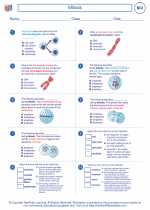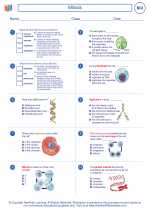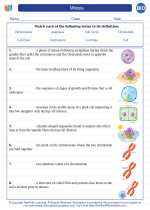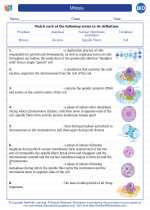Cell: The Basic Unit of Life
The cell is the smallest structural and functional unit of an organism, and is often called the "building block of life." All living organisms are composed of one or more cells. Cells were first discovered by Robert Hooke in 1665 when he observed a thin slice of cork under a microscope and coined the term "cell."
Types of Cells
Cells can be broadly classified into two categories: prokaryotic cells and eukaryotic cells.
- Prokaryotic Cells: These cells are simpler in structure and do not have a true nucleus. They are found in bacteria and archaea.
- Eukaryotic Cells: These cells are more complex and have a true nucleus enclosed within a membrane. They are found in plants, animals, fungi, and protists.
Cell Structure and Function
Common features of a typical eukaryotic cell include:
- Cell Membrane: A semi-permeable membrane that encloses the cell and regulates the passage of substances in and out of the cell.
- Cytoplasm: The gel-like substance inside the cell where organelles are suspended.
- Nucleus: The control center of the cell, containing genetic material (DNA) and responsible for regulating cell activities.
- Organelles: Various specialized structures within the cell, such as mitochondria, endoplasmic reticulum, Golgi apparatus, and chloroplasts (in plant cells), each with specific functions.
Cell Functions
Cells perform various functions to sustain life, including:
- Metabolism: The chemical processes that occur within the cell to maintain life.
- Cellular Respiration: The process of converting nutrients into energy within the cell.
- Reproduction: Cells can reproduce to create new cells through processes such as mitosis and meiosis.
- Homeostasis: Cells maintain internal stability and balance in response to changes in the environment.
Cell Theory
The cell theory, formulated by Matthias Schleiden, Theodor Schwann, and Rudolf Virchow, consists of three main principles:
- All living organisms are composed of one or more cells.
- The cell is the basic unit of structure and function in living organisms.
- All cells arise from pre-existing cells through the process of cell division.
Study Guide
To study the topic of cells effectively, consider the following key points:
- Understand the difference between prokaryotic and eukaryotic cells and their respective structures.
- Learn the functions of the major organelles found in eukaryotic cells.
- Explore the processes of cellular respiration, photosynthesis (in plant cells), and cell division.
- Memorize the principles of the cell theory and their significance in the study of biology.
- Practice identifying cell structures and their functions through diagrams and microscopy.
By mastering the fundamental concepts of cells, you will gain a deeper understanding of the intricate workings of living organisms at the cellular level.
[Cell] Related Worksheets and Study Guides:
.◂Biology Worksheets and Study Guides High School. Mitosis

 Worksheet/Answer key
Worksheet/Answer key
 Vocabulary/Answer key
Vocabulary/Answer key
 Vocabulary/Answer key
Vocabulary/Answer key
 Vocabulary/Answer key
Vocabulary/Answer key
